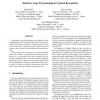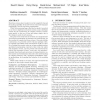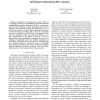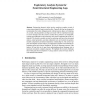277 search results - page 22 / 56 » Towards an automatic complexity analysis for generic program... |
ICDAR
2009
IEEE
14 years 2 months ago
2009
IEEE
In this paper, we make an attempt to use Inductive Logic Programming (ILP) to automatically learn non trivial descriptions of symbols, based on a formal description. This work is ...
HASE
2007
IEEE
13 years 9 months ago
2007
IEEE
Recent work in the area of Model-based Safety Analysis has demonstrated key advantages of this methodology over traditional approaches, for example, the capability of automatic ge...
EMSOFT
2005
Springer
14 years 1 months ago
2005
Springer
Real-time systems have reached a level of complexity beyond the scaling capability of the low-level or restricted languages traditionally used for real-time programming. While Met...
CSFW
2010
IEEE
13 years 11 months ago
2010
IEEE
—Quantitative information-flow analysis (QIF) is an emerging technique for establishing information-theoretic confidentiality properties. Automation of QIF is an important step...
DAS
2006
Springer
13 years 11 months ago
2006
Springer
Engineering diagnosis often involves analyzing complex records of system states printed to large, textual log files. Typically the logs are designed to accommodate the widest debug...




